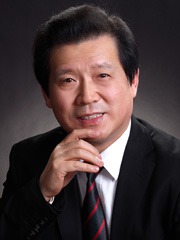|
 |
|
KIND-HEARTED: Yan Gongda (center) attends a ceremony where a fund named after him donated books to former revolutionary bases of the Communist Party of China in Anhui Province and quake-affected areas in Sichuan Province |
 |
|
Yan Gongda | For calligrapher Yan Gongda, calligraphy is not only an art but also a lifelong spiritual quest.
Yan comes from a literary background. He was born in 1948 in Changshu, east China's Jiangsu Province, descendant of ancient philosopher Yan Yan—himself a disciple of Confucius. From childhood, Yan was trained in calligraphy and Chinese ink painting.
After years of unremitting practice, Yan has excelled at several styles of calligraphy. In recent years, his caoshu style has blossomed into graceful works. While Yan's calligraphy is rooted in the ancient traditional style, he has also pioneered work on an abstract zhuanshu style.
Yan integrated his strong knowledge of traditional Chinese culture into the structure of characters, in which contemporary aesthetics are on full display.
Pursuing graceful art
Yan believes that a calligrapher should seek to refine one's taste throughout life. While average people have their own opinions about what fine art should look like, artists should refrain from pandering in their work. Still, Yan added, art ultimately stems from everyday life.
"Chinese calligraphy is not only an art of strokes but also an art of time. If we look at history, we will find that those calligraphy masterpieces handwritten by ancient artists were filled with social and cultural features of their eras," Yan said.
"For example, the greatest ancient calligrapher Wang Xizhi's masterpiece Preface of the Orchid Pavilion and Yan Zhenqing's A Funeral Oration for the Nephew, have both reflected people's sentiments of their times. With the backbone of culture, calligraphy can have great vitality and deep influence on a given generation," Yan said.
In Yan's view, a skillful work should reflect the characteristics of its time, as well as the traditional culture and individual features of the calligrapher.
"We yearn for masterpieces by contemporary artists. To create such works, calligraphers should throw themselves into real life and integrate their thoughts on human society into their art works organically."
"Furthermore, calligraphers should realize that calligraphy is a reflection of our national spirit, which plays an important role in uniting our society. That is the direction of art," Yan said.
"What is more, a calligrapher should never divorce himself from the people and his time. He or she should have gratitude to society and humanitarian spirit while respecting traditional culture," Yan said.
Cultivating moral characters
 |
|
One of Yan Gongda's cursive script calligraphy works |
An old Chinese proverb states that one's handwriting is like one's personality. Yan strongly agrees. Chinese characters, as a type of hieroglyphic, are uniquely capable of bringing out the individual traits of the writer.
In Yan's view, a person should first learn to behave correctly before learning calligraphy. If a person's ethics is lacking, then his or her calligraphy will suffer.
"As an artist, one should be indifferent to fame and wealth," Yan said. "A true calligrapher must have three traits: rich knowledge, brilliant inspiration and superb skill."
"Of all the arts, calligraphy is the hardest in which to reach a high skill level. The artist must create an abstract expression based on rich cultural knowledge. To be an outstanding calligrapher, one must first have an in-depth knowledge of philosophy, history, literature and even music. One has to spend many years learning different subjects and integrate them into calligraphy and eventually create one's own style," Yan said.
"To some extent, the secret of calligraphy cannot be explained by language. It can only be understood by a feeling in the heart," said Yan. "For this reason, calligraphy is not so much a skill but rather a philosophy."
Yan said calligraphy embodies the moral principles of Confucianism. One can understand the philosophy of life through calligraphy. Many calligraphers have attained "excellence in both calligraphy skills and moral integrity" through their artistic careers and charitable activities.
Yan believes that repeated practice over a long period is the way to mastering calligraphy. Apart from practicing, a calligrapher should be immersed in human emotion and gradually comprehend the true meaning of the art.
| 